
AFFECTOR – Rise Of The Beast
Anthony Morgan
May 2012
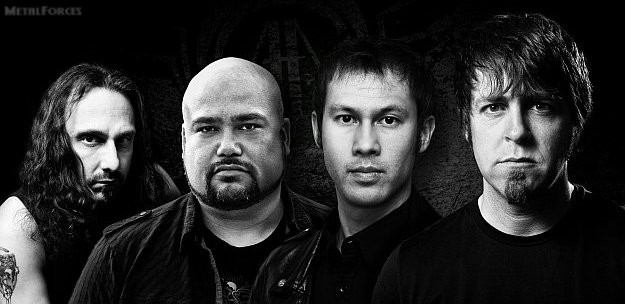 Affector (l-r): Mike LePond, Collin Leijenaar, Daniel Fries and Ted Leonard |
![]()
International progressive metal outfit Affector formed during 2006, Dutch drummer Collin Leijenaar acting as the touring drummer for Neal Morse (ex-Spock’s Beard / Transatlantic / Flying Colors) at the time. Following the conclusion of one specific show Neal Morse as well as his group remained at the venue, talking to fans and so on. German guitarist Daniel Fries approached Collin, saying ‘I got this CD of music that I wrote. Do you want to listen to it?’ Collin responded ‘Yeah, cool. I don’t have anything to do right now, so let’s listen to it.’
“We went to his car,” supplements Collin Leijenaar. “I had an hour to kill or something because the crew were still breaking down stuff, and Neal was talking to fans. I listened to the music, and I was really astonished by what I heard. It was like ‘Wow, this is very good music.’ I liked his guitar playing, but I also liked the songwriting. Somehow I kept in mind his songs, and that he was such a good songwriter and such a good player. We exchanged info, and I think a year later we put forward the idea of recording an album together but without any pretensions. We didn’t have a label yet. We’re just two guys that met by accident actually, and that’s how Affector came to be. Of course, it was over a four-year period that this whole thing happened.
“We had a lot of writing sessions together, and then we were talking about a singer, a bass player, and a keyboardist. We asked some people just to guest on our album, Ted (Leonard) and Mike (LePond). We really loved what they were doing, but it was not really supposed to be a band at first. It was just two guys making an album. To our ears, the music was getting more and more to where we wanted it. We thought ‘Well, maybe this is just too good to put on a CD for ourselves and put on a shelf. We should do something with this.’ We asked Ted and Mike if they would be willing to be a part of a band, and luckily they said yes to that. They loved the album. They loved the music we made together, so we formed a band, really finished the album, and made it what it is right now. In a nutshell, that’s four years of how Affector came to be.”
Mike LePond (Symphony X) occupies bass, while Ted Leonard (Spock’s Beard / Enchant / Thought Chamber) supplies vocals. “Daniel was already in contact with them,” the sticksman divulges. “He met them at concerts and got to know them, so they were emailing a lot. They were just talking about the music we were writing together, and whether they wanted to be involved. We thought ‘Mike is a great bass player and Ted is a great singer, so why not? Why not have them?’”
In christening the quartet Affector, Collin sought a moniker beginning with the letter A. “Then you’re always on top of the list,” he explains. “It wasn’t easy (laughs), but we were just sharing ideas. I think we had like 300-400 different band names on paper, and then somebody suggested this name. It stuck in our mind, and we chose it.”
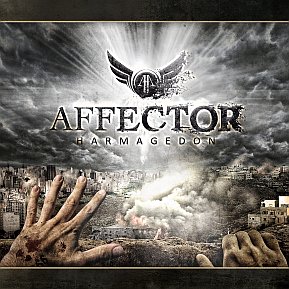
|
Progressive metal at heart, progressive metal ensembles naturally influence Affector. “I think our influences are pretty obvious,” the percussionist admits. “We love music like Dream Theater, Symphony X, and all that stuff – the prog metal stuff – but also the old stuff like Genesis and Rush we all love to listen to. Of course, when people hear the album they might say ‘This is a little bit like Dream Theater’ or ‘This is a little bit like that.’ Of course that’s what happens when you listen to music you like; you happen to write music in that same range. Dream Theater is one of the big influences for myself. Daniel is a big Symphony X lover, and he also loves Metallica and that kind of stuff.”
Erstwhile Dream Theater member Mike Portnoy (Adrenaline Mob / Flying Colors / Transatlantic / Liquid Tension Experiment / Liquid Trio Experiment / ex-OSI) influences Collin’s drumming. “I’ve been playing with Neal Morse for six years now, and in that time I had to really study Mike’s playing because Mike was doing all the albums for Neal Morse and I was doing all the live shows,” he notes. “I had to play his parts, so I really studied his work and I really got into what he was doing. That is reflected in my playing as well, because I really like what he’s doing. Before I was playing with Neal I was already a fan of Mike’s music, so in that respect, yeah, he’s definitely an influence on my drumming. I also like music that is played by Simon Phillips (Judas Priest / Michael Schenker Group / Derek Sherinian / The Who / Jeff Beck / Toto), Jeff Porcaro (Toto), and those kinds of players.”
Six years separate Affector’s 2006 formation and the issue of debut full-length Harmagedon. “It wasn’t intended to be an album that would be released,” the rhythmist confesses. “First it was just two guys making music, and then it grew into more and more and more. With every step we were taking, we were reaching a higher level. It’s been awhile. We’ve also been extremely busy; I’ve been touring with Neal Morse, and next to playing I’m also a director and owner of a music school. That takes up a lot of time as well. All in all there was not enough time to only focus on one thing, so that will take some time of course as well. The main thing is it started as a hobby though, and turned into this band. That took some time.”
Songwriting began in 2008, Collin and Daniel creating demos based on separate and collaborative musical ideas. “What happened was Daniel had some ideas, and I had some ideas,” Collin elaborates. “We put them together, and when we were writing it was just guitar and drums. There was no bass, no vocals – just guitar and drums. We were just playing around with riffs and grooves, and trying to find cool stuff. When I was getting music from him to write drum tracks to it was just guitar and click, so there was no form whatsoever. We really could dig deep in finding nice grooves that were layered with his playing, and vice versa. That was the basic way we wrote but everyone was involved, even the guests. We gave them carte blanche, so whatever they wanted to do – whatever they felt would contribute to the music – they could do. At first we played drums and guitar, and then the bass came. If Mike wanted to change the bass parts, that was fine. Just whatever he felt inspired to play he could play, and that was the same for everybody. That made it quite interesting because you didn’t know what you got back.
“We didn’t record in one studio; there was no budget available to be able to fly everybody in, and do a few weeks of studio sessions. There was no money, so everybody did it at their own place. It was quite interesting though. When we got the tracks back from Ted when he was ready with the vocals, we were just amazed by what he did. We had some ideas of course – some guide vocals – but he took it to another level. It was really awesome, and the same with Jordan Rudess, Neal Morse, or Derek Sherinian. When we got those parts back we were like ‘Woah, what did they do?’ Some parts were just totally different than we thought they would be, but that’s the beauty of working this way. Everybody can put their own ideas and their own inspiration, what they feel at that moment. They can put it in without having a producer say ‘No, you should do it like that’ or something.”
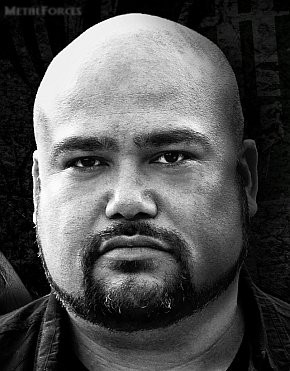
|
Neal Morse, Jordan Rudess (Dream Theater / Liquid Tension Experiment / Liquid Trio Experiment), Derek Sherinian (Black Country Communion / ex-Dream Theater / Yngwie Malmsteen), and Alex Argento all cut guest keyboard parts for Harmagedon. “We first started with only guitars, drums, bass and vocals, and of course we wanted to have keyboards,” the skin-beater expounds. “We were thinking of how we should do that. I had this idea of having a few guests, but felt that we should have a main guy that was present on all of the songs. That was so we have one sound, so that doesn’t sound like a collection of songs with a collection of musicians. Somehow it should have a band feel in the keyboards as well. I got to know Alex Argento by his solo album Ego (2007), which is an awesome album. I was a fan of him immediately when I heard that album, so I asked him if he would be interested in doing our album as well. He did the main parts of the whole album, but then we wanted some guest solos. We were just shooting around ideas, like ‘Who shall we ask?’
“Derek Sherinian came to our mind immediately; we were like ‘We should have him.’ Through Derek’s official website, anybody can ask him to play on their music. He will listen to it; if he likes them, then he will be a session player. We asked him to do a song, and that was ‘Falling Away & The Rise Of The Beast’. He played on that, and he did an awesome job. Actually, for that song he did all of the keyboards except for two solos that are by Neal Morse. Of course my involvement with Neal is pretty obvious; I’ve played with him for six years, so it was very easy to ask him. I really felt that ‘Cry Song’ – he played on ‘Cry Song’ – really suits his style of playing, and he did an amazing job.
“We just thought he would do some keyboards and piano or whatever, but I got a bunch of tracks with all these different sounds so we had a selection to choose from. It was really awesome what he did. Then during I think it was 2009 or 2010, Neal Morse opened for Dream Theater in Germany. Backstage I talked to Jordan Rudess about this album and asked him if he would like to be a part of it, to do some solos. He said ‘Let me hear some of the songs, and if I like them I’ll be happy to do it.’ We sent him some songs, and I think half a year to a year later we got his tracks. Yeah, awesome.”
A concept full-length, Harmagedon explores the predictions – courtesy of the Mayan calendar and the writings of Nostradamus – that the world will cease to exist during 2012. Biblical verses are exclusively used to sing the tale. “We were shooting ideas back and forth about the concept, what would work lyrically, and what we would do with this album,” Collin recalls. “It’s released in 2012, and especially last year there were all these stories about how 2012 will be the end of the world, the whole apocalypse, and the Mayans. Here in the Netherlands you heard a lot about it, so we spoke about that and said ‘Let’s do something with that. It could be fun to have an album coming out in 2012.’ A timely thing, you know? That’s how we came to explore that concept but then there’s what you’re going to tell, what you’re going to do about it. We thought ‘Let’s read one of the books that talks about the end of the world,’ and that was Revelations from the Bible.
“We didn’t wanna do it in a way that told people what they should personally believe or not though, because we don’t know and I don’t know what’s going to happen. I don’t know if there will be end times. We thought ‘Let’s just use the words as they are in the Bible’ and just sing those words exactly how they are in the Bible, word for word, and not put any human thought into that. Just tell it as it is, and everybody can do whatever they want with it. It’s just one way of seeing things and that’s it, so that’s how it came about. It was quite difficult to make music with that of course, because those words aren’t written to be used in music. There’s no rhyme in it, there’s no rhythm. It’s just words, so we had quite a problem getting all the music and all the words together. I think it’s impossible to get the whole story on one album though (laughs). It’d be six or seven discs or something, so we selected what we think are the major things that tell the story in just eight songs. Daniel and Ted really worked on that, and they did an awesome job I think.”
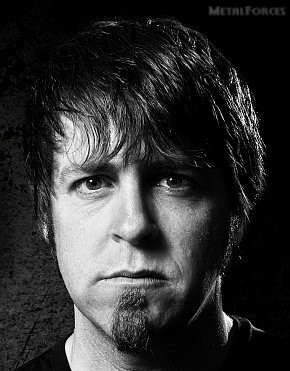
|
The drummer feels that Harmagedon is the most progressive full-length he has cut to date. “I’ve done some live stuff with Neal of course that was pretty progressive, but in terms of playing original songs this is the most progressive I’ve done,” he confirms. “I’m proud of what I played, but it is what came out at the time of recording it. I recorded my drum tracks last year. I first had different tracks for the recordings, but like I said, the songs were reshaped. Sometimes we re-recorded because we developed a cooler sound or something. I thought at one point ‘Let’s redo some drums,’ but I redid the whole album. It’s been a long period of getting the songs into the shape that we loved, where we thought they were finished. That took a lot of recording.
“I think it helped me a lot having played with Neal Morse to get into that progressive style, because before Neal Morse I wasn’t really doing a lot of progressive stuff but more mainstream rock stuff. I really liked what I did. I’m amazed by what this music has already done for us, because of what I said earlier. This album wasn’t written in the first place to be heard by the masses, to be released on a record label. We just wanted to make some music we like, and just document some ideas we had. Now I’m talking with you about this album, so it’s a dream come true.”
Collin, meanwhile, feels that Daniel’s guitar playing “has everything you expect from a progressive rock / metal guitarist. He has really good techniques so he can make great solos, but also has a very good sound and groove to it. I think he’s also very, very strong as a songwriter. A lot of the vocal stuff he arranged and wrote – Daniel and I together wrote the songs. He’s a really, really good songwriter, and I think we will hear a lot more from him and hopefully from Affector of course. The funny thing is though that next to being a musician, he’s a doctor. He works at a clinic. It’s really funny to have a doctor in the band (laughs).”
Opening number ‘Overture Pt. 1’ is complimented by Sinfonietta Consonus, a Polish orchestra helmed by Michał Mierzejewski. “At first it wasn’t supposed to be a concept album, but just a selection of songs,” the sticksman acknowledges. “We were just writing stuff, and it happened to become a concept album. We thought ‘Why not use a classical opener to start a piece of music, to introduce certain themes of the music?’ We were just playing around with that, and then we first wrote ‘Overture Pt. 2’ with just the band playing. We liked it. Then I got to know Michał Mierzejewski, the director and arranger of the orchestra. I asked him to do the same, to make an intro. I was thinking maybe a 20-second intro to what we play in ‘Overture Pt. 2’, just one part called ‘Overture’ and that should be it. He then sent me his ideas though and there was this whole, nice intro, almost like a soundtrack to a movie. We loved it, so we just said ‘Let’s combine those things to make one big overture with two movements.’ That’s how that came to be.”
‘Salvation’ is the inaugural composition Affector worked on, and the inaugural composition the band authored and recorded. “I think that song even dates back to 2006,” Collin adds. “We were shooting ideas back and forth on that song almost six years ago, so that song I think is the foundation of the whole album and the foundation of what Affector is at this moment.”
‘The Rapture’ as well as the title track ‘Harmagedon’ comprise the lengthiest tunes on the records. “I think those two are my most favourite songs on the album,” the percussionist enthuses. “I like how they have so many movements, some lighter parts, and some heavy stuff. Those are the two songs from this album that are closest to my heart in terms of what I musically like, and we were very, very honoured to have Jordan Rudess on both songs doing some solos. I love them.”
A departure from Harmagedon’s lyrical concept, ‘Cry Song’ was penned regarding the passing of Daniel’s father. “When I got the lyrics Daniel said ‘I’ve written these lyrics, and I think they fit on the album,’” Collin augments. “Reading those lyrics, I thought ‘That could fit.’ If you were in a time of end times where everything is dying around the world and you really feel the world is going to end, how you would you feel? That was my feeling about that song. Later I heard that he wrote that song for his father who passed away two years ago I think… I’m not sure… Two or three years… I don’t know exactly when, but after his father passed away he wrote that song. It’s a very personal song about his feelings, about the time his father passed away and what was going on in his mind. Somehow it fits beautifully inside the story though, so it unintentionally has a double meaning.”
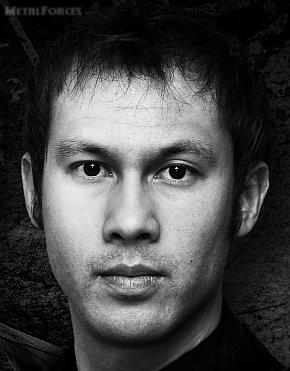
|
‘Falling Away & The Rise Of The Beast’ sits at position six on Harmagedon’s track listing. “Every track on the album started with guitars and drums, just Daniel and me writing the song,” Collin clarifies. “It slowly grew into what it is by adding the guests and adding the rest of the band. I think it’s a nice track. With every song we tried to not be in one mood all the time because people want to have some change as well. When you hear a song it shouldn’t always be the same, so we tried to get some movement but also be rocking in parts. I think it’s mostly like all the other songs are as well, the mixture of different styles and different feels but with Derek’s sound. You can easily hear it’s Derek with his keyboard sound, so we were very honoured to have him on that track as well.”
Swansong number ‘New Jerusalem’ was one of the last tracks to be recorded for Harmagedon. “That’s a little more mainstream, straightforward song,” the rhythmist critiques. “Daniel is into Metallica, and all that kind of stuff. I also like modern metal stuff. We’re not only listening to progressive music, but also mainstream stuff. I think that comes a little bit to the front in a song like ‘New Jerusalem’; still it’s a progressive song, but it has a more straightforward feel. In between the time those songs were written, I think the songs evolved. If you listen to the first demo we did for ‘Salvation’, it’s totally different to what it is now. During the years we kept changing the songs, the arrangements, and even the time signatures etcetera. They evolved and became what they are right now.”
Limited edition CD versions of Harmagedon include acoustic renditions of the title track and ‘New Jerusalem’. “They’re a little different,” Collin reckons. “We didn’t have any bonus tracks when we finished the album. I was in LA for a month mixing this album with Rich Mouser, and during that mixing process I was thinking ‘We should have some bonus tracks so we can release a special edition, or something like that.’ I called Daniel in Germany, and said ‘Get behind the microphone in your studio, and just record a few acoustic songs so that we have some bonus material.’ He sent them to me. He sings on those songs, and it shows how good his songwriting is.
“It’s progressive rock and metal, it’s bombastic with an orchestra, and has a lot of layered guitars, keyboards and everything. It’s a big step, but then just hearing him play the same songs on just acoustic guitar is awesome. I think it really works. As I was listening to it, I thought maybe it’d be nice to include some of the orchestra parts from the original, bigger, full band version. I played around with that in the studio, and added some of the orchestral arrangements to his acoustic version of ‘Harmagedon’. I think it just works really, really great – you should listen to those tracks. He’s got an awesome voice. Of course when we play this live, he will be doing backing vocals as well. I think Daniel’s timbre is a little different to Ted’s. Ted has a bigger range; he can go really low, really high. Daniel is first and foremost a guitar player, but happens to have a great voice as well.”
Cover artwork duties were handled by Daniel Latsch. “Daniel Latsch is a personal friend of Daniel our guitar player,” the skin-beater imparts. “He played him parts of the album, because it wasn’t finished at that time. They spoke about the concept, and then he just went behind his computer and did his magic. There was the artwork. It almost looks like a film poster for some epic movie, or something. We really felt that this would be the cover we wanted.”
On February 28th, 2012, it was publicly revealed that Affector had inked a record contract with Inside Out Music, Inside Out Music handling the release of Harmagedon. “I was posting on my Facebook page a lot of times that I was working on this album with all these musicians,” Collin discloses. “I work as a tour manager for Transatlantic, and I work as a tour manager, drummer, band leader or whatever for Neal. I got to know Thomas Waber, the director of Inside Out. We were friends on Facebook, and he saw those posts. On one post he asked me what Affector’s music is about, and if I could send him something because he was interested. I sent him I think half of the album, and the rest is history.”
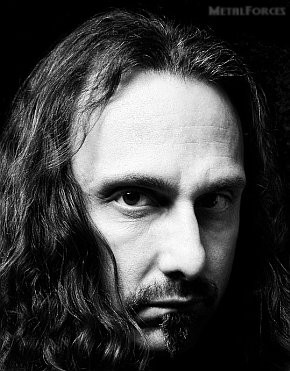
|
Affector harbours desires to conduct live performances. “At this point we’re gonna wait first before we make any bookings, because I don’t know how the album will be received,” the drummer cautions. “I’m just waiting to see how the album does, but definitely we want to hit the road and do concerts. When, we don’t know. There are already quite a few promoters that have emailed me about whether we would be interested in doing a tour. We are gaining interest, but at first we wanna see how the album is going to be accepted.”
A sophomore full-length awaits in the pipeline. “At this moment we’re already writing songs for the next album, but it’s at a very early stage,” Collin stresses. “For two to three songs we’ve got quite interesting ideas, but we haven’t recorded anything major yet. We haven’t talked about lyrics yet though. I was thinking about the unique concept of having parts of a book being sung to music. I think it’s an interesting process, so I was thinking maybe a talking book or something but also something epic. Probably it will be something completely different like this one though; we don’t like to do the same thing over and over again, but like to reinvent the same concept in a new way. We’re not sure what’s going to happen, but maybe it’ll be a mixture of stuff. I think probably it won’t be a concept album, but that’s what we said when we started writing this one as well. Who knows? We will definitely record a second album, but when I don’t know.”
Harmagedon was released in Germany, Austria, and Switzerland on May 18th, 2012, on the 21st in the rest of Europe, and on the 22nd in North America, all via Inside Out Music.
Interview published in May 2012.
Related Posts via Categories
- SCOTTISH SICKNESS – A Report On The Scottish Death Metal Scene, Featuring BRAINBATH, PUTRID FATE And RANCID CADAVER (October 2022) | Features / Interviews @ Metal Forces
- LARVAE – Join The Hardcore Cult! (June 2022) | Features / Interviews @ Metal Forces Magazine
- TRENCH FOOT – Sacrificing Morals For Gory Obscenities (June 2022) | Features / Interviews @ Metal Forces Magazine
- L.A. GUNS – Trigger Happy (March 2019) | Features / Interviews @ Metal Forces Magazine
- CANCER – Crimes So Evil (November 2018) | Features / Interviews @ Metal Forces Magazine
- U.D.O. – The Tank Drives On (August 2018) | Features / Interviews @ Metal Forces Magazine
- SIEGE OF POWER – Bleeding For The Cause (August 2018) | Features / Interviews @ Metal Forces Magazine
- MOONSPELL – A Taste Of Live Eternity (August 2018) | Features / Interviews @ Metal Forces Magazine
- MONSTROSITY – Dark Matter Invocation (August 2018) | Features / Interviews @ Metal Forces Magazine
- SATAN – Five Magicians (August 2018) | Features / Interviews @ Metal Forces Magazine
|
|





